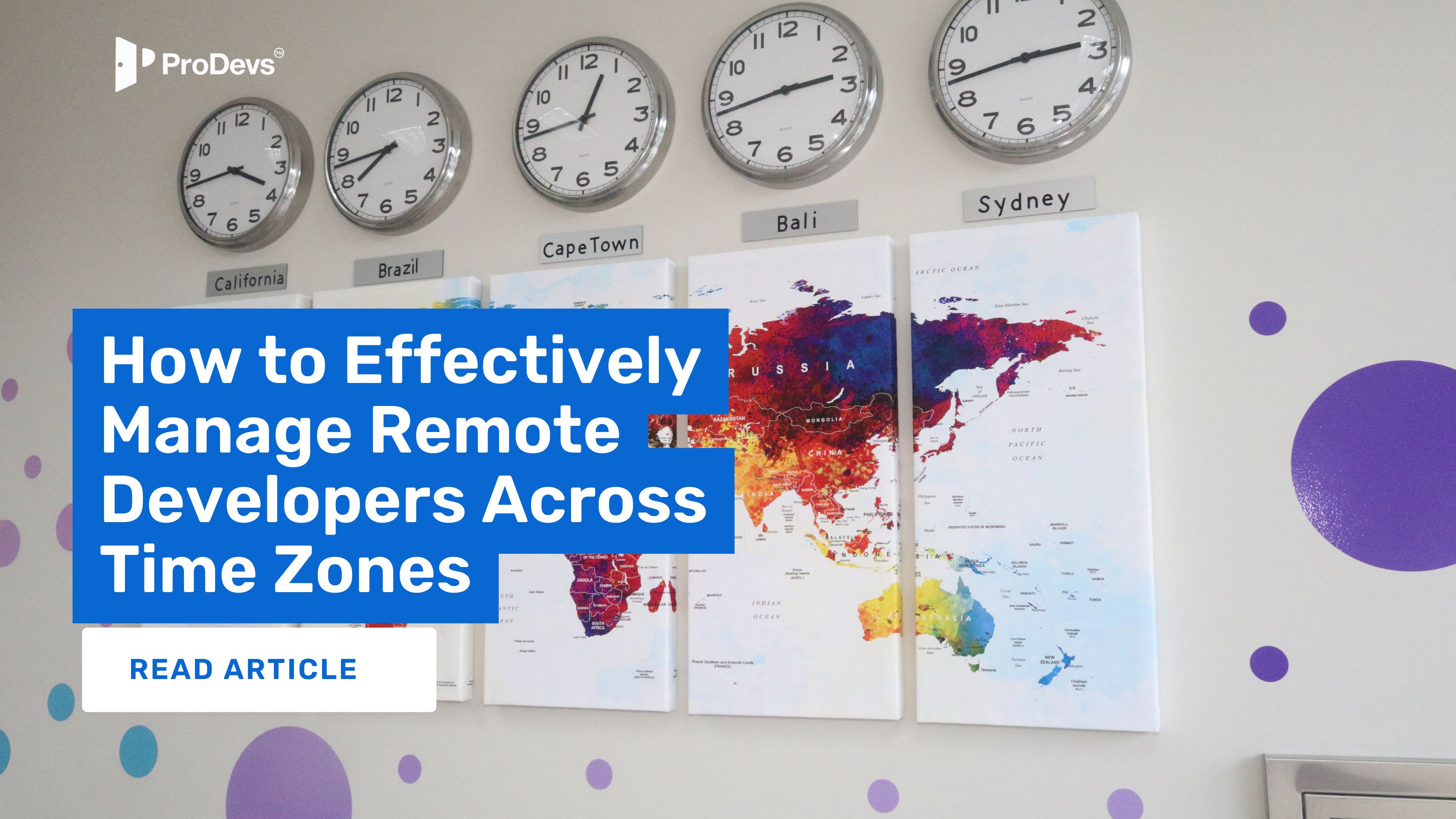10/06/20255 Mins read

You’ve built a remote dev team, congratulations. You’ve unlocked global talent, reduced overhead, and built flexibility into your workflow.
But there’s a catch.
Your frontend developer is in Nairobi. Your backend lead is in Berlin. Your QA engineer is somewhere between São Paulo and “offline.” Meanwhile, you’re stuck trying to coordinate a team standup that everyone can attend without someone sacrificing sleep or sanity.
Sound familiar?
Welcome to the world of managing remote developers across time zones — one of the most powerful (yet most misunderstood) aspects of modern tech teams.
Let’s break it down and talk about what actually works — and how you can keep your team productive, aligned, and happy, no matter where they are.
One of the biggest mistakes managers make with remote teams is trying to recreate the in-office experience online.
The result? Calendar chaos.
Instead of forcing everyone into the same timezone box, lean into async workflows.
That means:
Using tools like Notion, Trello, or Linear to document tasks and priorities
Recording Loom videos for updates or walkthroughs
Encouraging devs to comment directly in PRs or tickets instead of waiting for meetings
If your developers are waiting for you to wake up before they can move forward, you’re not remote, you’re just delayed.
In a distributed team, good documentation isn’t nice to have; it’s essential.
Without clear processes and specs, developers in different time zones are left guessing or pinging people who are fast asleep.
Make it a habit to:
Write project briefs with context, not just tasks
Document onboarding steps, coding standards, and architecture decisions
Maintain a shared knowledge base that’s always accessible
Remember, documentation replaces the hallway conversations your team can’t have.
Even the most async-friendly teams need some real-time interaction.
The trick is to find your golden overlap, that 1–3 hour window when most of the team is online.
Use it for:
Quick huddles or sprint planning
Pair programming sessions
Weekly retrospectives or demos
Be respectful. Don’t stretch overlap time just because you’re online. Protect your developers' deep work hours, especially when they’re on the other side of the world.
Here’s a mindset shift: in remote, distributed teams, it doesn’t matter when someone works, it matters what they deliver.
Tracking hours becomes messy and micro-managerial. Instead:
Set clear KPIs and sprint goals
Define what success looks like for each task or feature
Create space for autonomy and self-management
You’ll be amazed how much trust + accountability = productivity.
Time zones are only a challenge when your tools don’t support collaboration.
Here’s what works best:
Slack or Microsoft Teams for quick async comms
Jira / Trello / ClickUp for task tracking
GitHub / GitLab for code collaboration
Loom / Zoom / Google Meet for the occasional sync or update
Clockwise or World Time Buddy to schedule meetings fairly across regions
The tools don’t have to be fancy. They just have to be used consistently and thoughtfully.
Managing across time zones can feel transactional. But developers are people, not ticket-closing machines.
Create opportunities to:
Celebrate wins (big and small)
Host casual coffee chats or team bonding games
Check in on mental health and workload
A few small gestures, a Slack shoutout, a birthday message, and a virtual team lunch go a long way in building remote loyalty and trust.
At ProDevs, we don’t just help you hire remote developers; we help you build globally distributed teams that work.
Here’s how we make managing across time zones seamless:
We match you with developers who are used to async work and distributed systems
Our talent pool includes remote-savvy African engineers who align with your timezone needs
We ensure cultural fit and excellent communication skills — no more language or clarity gaps
We offer ongoing support, so you’re never alone when managing or scaling your team
And best of all? No platform noise or middlemen. Just a real relationship.
Whether you’re a startup founder juggling multiple hats or a CTO building across continents, ProDevs gives you the tech talent and tools to thrive, not just survive, in remote work.
Managing developers across time zones doesn’t have to be chaotic or complicated. With the right mindset, tools, and partners, it can be a superpower, not a bottleneck.
Want to build a high-performing remote dev team without timezone headaches?
👉 Let’s talk: www.prodevs.io
Wherever you are, we’ll help you build smarter — and globally.

Enter Edoko, the mobile app that revolutionizes the online shopping experience for Nigerians. And behind this innovative solution stands the team of developers at Prodevs, who used their expertise and creativity to bring this idea to life.
24/03/2023 | 2:19 PM
By Yetunde Hassan

Scaling your dev team? Learn how to grow fast without sacrificing code quality or culture—plus how tools like TalentApply help you hire smarter in 2025.
24/07/2025 | 8:19 AM
By Yetunde Hassan

Hire vetted and smart African talents today

651 N Broad St. Suite 206, Middletown, DE 19709, USA

89 Monaco Court, Brampton, ON L7A 1X2, Canada

2nd Floor, 10 Hughes Avenue, Alagomeji, Yaba, Lagos, Nigeria.
Copyright © 2025. ProDevs Outsourcing Inc.